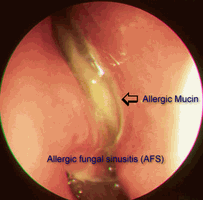
Fungal Sinusitis and Sinus Infections

Researchers from the Mayo Clinic performed a study on chronic sinus infections and came up with some amazing results. In the study, they discovered that the cause of the majority of chronic sinus infections is an immune system response to fungus in the sinus cavities. This literally changes everything in terms of how sinus infections should be treated. Chronic sinus infections are a huge health issue in America and the rest of the world. In fact, it has been estimated that approximately 40 million or more people in the United States alone are affected by chronic sinusitis. The term sinusitis is defined as an inflammation of the lining of the nasal and sinus cavities. The number of cases of chronic sinus infections has been steadily increasing over the past 10 or more years. This is a huge problem that “up to now the cause of chronic sinusitis has not been known” said the Mayo Clinic researchers consisting of Dr. David Sherris, Dr. Eugene Kern and Dr. Jens Ponikau, who are Mayo Clinic ear, nose and throat specialists. Their report appeared in the September, 1999 issue of the journal Mayo Clinic Proceedings. Interestingly, if you search for the study on the Mayo Clinic website, you will no longer find it as it has been completely removed. All references to the study have also been deleted. If left untreated, chronic sinus infections and specifically chronic fungal sinusitis can lead to growth of nasal polyps. Nasal polyps are strange growths that look similar to small grapes growing inside of the nasal passages. Nasal polyps are both annoying and can hinder normal breathing function. Nasal polyps are often associated with fungal sinusitis and chronic sinus infections. The study has started to impact the way the some doctors think about sinus infections and sinus infection treatment. "Fungus allergy was thought to be involved in less than ten percent of cases," says Dr. Sherris. "Our studies indicate that, in fact, fungus is likely the cause of nearly all of these problems. And it is not an allergic reaction, but an immune reaction." If true, this would mean that the use of antibiotics for sinus infections is useless and would turn the entire sinus infection treatment paradigm on its head. In the study performed by the Mayo Clinic researchers, there were 210 patients with chronic sinus infections that were tested for fungus in the sinuses. What they found was shocking.... 96 percent of these 210 patients had fungus in their sinuses. These researchers utilized new methods of collection and testing mucus from the sinuses not performed previously. These yielded amazing results and ended up showing that 40 different types of fungi and mold were present in the patients' sinuses with an average of almost 3 types per patient. In a subset of 101 patients who had surgery to remove nasal polyps, these same Mayo Clinic researchers discovered eosinophils in the sinus tissue and nasal mucus of 96 percent of these particular patients. Eosinophils is a type of white blood cell that is activated by the body's immune system. The body's immune system sends the eosinophils to the the location of the fungus in order to try to combat it. This can cause irritation of the mucus membranes in the sinuses and possibly cause the growth of nasal polyps. "This a potential breakthrough that offers great hope for the millions of people who suffer from fungal sinus infection," says Dr. Kern. "We can now begin to treat the cause of the problem instead of the symptoms." Initially it seemed that more research would be taking place at the Mayo Clinic to confirm that the immune response to the fungus was actually the cause of the sinus inflammation. The researchers were also working with pharmaceutical companies to set up trials to test medications to control the fungus. At the time of the study they estimated that it will be at least two years before a treatment would be widely available. But something has apparently changed as this study was erased from the Mayo clinic website along with any mention of it. In fact, it has been over 13 years since this study was completed and nothing has happened ever since. Antibiotics, nasal steroids and over-the-counter decongestants are most commonly used to attempt to treat chronic sinus infections. However, recent studies have shown that antibiotics are not effective for chronic sinusitis because they target bacteria, not fungi. It is highly unusual that a study like this could be conducted and then no follow up would happen for the next 13 years. Note: This story has been adapted from a news release issued by https://www.mayo.edu/. Source: https://www.sciencedaily.com/releases/1999/09/990910080344.htm |
DISCLAIMER
The USFDA has not evaluated, nor rendered approval for any statements, testimonials or research cited herein, nor have they approved any representations or opinions concerning colloidal silver. Silver Sinus and Silver Cold & Flu Relief are dietary supplements and are not intended to diagnose, cure, prevent or treat any disease.
Silver Sinus and Silver Cold & Flu are not drugs and the information and opinions we offer are based upon use of these products as a dietary supplements only. We have no doctors on staff and do not offer medical advice concerning colloidal silver. We suggest that you consult a licensed physician if you believe you have a serious health issue. We also recommend that you do comprehensive research about colloidal silver before accepting our opinions or the opinions of anyone else about how to care for your health.
Silver Sinus colloidal nasal spray and Silver Cold & Flu Relief are natural mineral supplements of the highest quality available. While various studies have shown the effectiveness of colloidal silver against numerous fungi, bacteria, parasites and viruses, SilverSinus.com makes no claims, expressed or implied, concerning the healing or preventative nature of Colloidal Silver.








